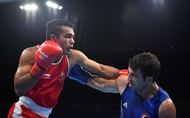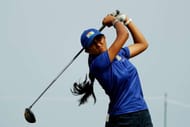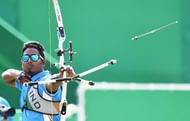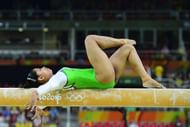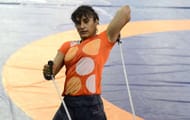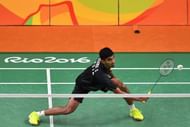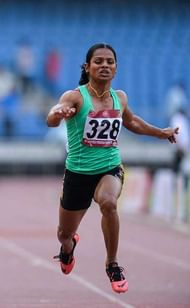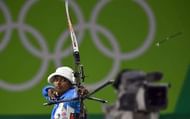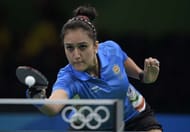It’s the end of Rio 2016, and India, who had a 119-member contingent at the quadrennial games, ended today with India netting two medals – a bronze for freestyle wrestler Sakshi Malik, followed quickly by silver for Indian shuttler P.V. Sindhu.
Barring those two performances, it has been a disappointing run for the Indian contingent in Brazil. That said, a number of players showed immense promise at the Games.
Here, we look at ten of India’s future Olympians, who made their mark this year too:
Prarthana Thombare
22-year-old tennis player Prarthana Thombare made her Olympic debut at Rio 2016, partnered by the best in the business – doubles World No. 1 Sania Mirza. The two had previously partnered each other to success at the 2014 Asian Games in Incheon, South Korea, where they won bronze, but at Rio were unable to fire.
The Indians saw a first-round exit in the women’s doubles courtesy the powerful Chinese pair of Shuai Peng and Zhang Shuai in a three-set match. Although they lost the first set, Mirza and Thombare, who trains at the Sania Mirza Academy in Hyderabad, showed all the signs of putting up a resilient fight as they won the second.
At key moments where the experienced Mirza remained unable to hold serve, or appeared nervous, it was Thombare who held both; this was perhaps instrumental in the Indian pair’s loss being closer than it would otherwise have been.
Thombare has all the markings of a future doubles champion, much like Mirza. Although she is not 'young’ by tennis players' standards, the Solapur native, whose tennis career is quickly on the upswing, could hold future hopes for India’s success at tennis.
Read more: Sania Mirza/Prarthana Thombare knocked out in Round 1
Vikas Krishan Yadav
Vikas Krishan was one of the lone bright lights for India in boxing, winning two bouts before bowing out in the quarterfinals to Bektemir Melikuziev of Uzbekistan. He provided plenty of entertainment for Indian fans in his first two rounds, and was one win away from becoming only the third Indian boxer to ever win an Olympics medal.
Vikas is just 24, and his compsoure on the big stage is a big plus for his future. While the Indian boxing association may be in a mess, Vikas made his performance speak for itself, and his quarterfinal appearance was beyond the expectations of even the most optimistic Indian fan.
The way he’s gone about his business, Vikas could well win a medal in Tokyo!
Aditi Ashok
One of only three Indian golfers at Rio 2016 – with top golfers Anirban Lahiri and SSP Chawrasia – and the sole woman, 18-year-old Aditi Ashok had been making waves on the golfing circuit for a number of years before her qualification for Rio 2016.
Ashok was the sole Indian golfer to have played at the Asian Youth Games of 2013, and the Youth Olympics and Asian Games the following year. In 2015, she became the first Indian to win the Ladies’ British Amateur Tournament. This year, she added the Rio Olympics to that kitty.
The teenager performed very well at the Olympics in Brazil, even looking to be on the cusp of a medal for the country. Day 1 and Day 2 were incredibly successful for the Bengaluru-based teen, who even took a lead at one point during the first two days. Unfortunately, in a sport where consistency is key, Ashok lost out on Day 3, eventually finishing in 31st.
But the games saw her do incredibly well given her age, and she is a definitive hope for the sport in the future.
Atanu Das
Much had been expected of India’s archers at Rio 2016, and although Bombayla Devi Laishram did deliver a couple of standout performances during the team events at the Olympics, the archers were unable to fire as expected.
24-year-old Atanu Das, about whom not much had been touted ahead of the Olympics in Rio, was the star of India’s archery sojourn. Finishing at a respectable 5th in the ranking rounds, the Indian archer delivered a number of good performances in Rio, and even in the pre-quarterfinals, put in a rousing rout against his opponent, Korean World No. 8 Lee Seungyun, hitting six 10s and eight 9s. It was a good showing from the 24-year-old, participating in his first Olympics, and it was only due to a spotless performance by his opponent that Das missed out on progressing further.
With his performance, Das proved his mettle as a hope for Indian archery.
Dipa Karmakar
The young gymnast from Tripura was one of the country’s most feted names at Rio 2016. In a sport that is neglected in India, one that has seen few, if any names emerge from the country, Karmakar gave it her all. The 22-year-old started out struggling with flat-footedness, overcoming that first physical barrier in reaching where she has.
Karmakar set a number of records in just making the cut at Rio 2016 – winning gold in the qualifiers. The first ever female gymnast from India to qualify for the Olympic Games, she was also the first Indian gymnast, irrespective of sex, to qualify for the Olympic games in over half a century.
The 2014 bronze medal winner at the Commonwealth Games in Glasgow had been due to perform the Produnova or the Death Vault, considered one of the most difficult and deadly in gymnastics.
Making the cut at Rio for the vault finals, Karmakar only narrowly missed out on a medal, finishing in fourth place overall.
The young woman put her immense talent on display on the world stage, a feat all the more laudable given the dearth of gymnastics infrastructure and equipment in the country, and has become a sporting icon for the country, and arguably the country’s first figure for aspiring gymnasts to look up to.
Her performance at Rio has likely opened up avenues for the gymnast, who should now be able to train better for future tournaments.
Vinesh Phogat
The first female sportsperson to qualify for the Rio Olympics in 2016, Haryana-based wrestler Vinesh Phogat is all of 21 years old but has excelled on the world stage.
Relatively inexperienced when she first burst onto the scene at the 2014 Commonwealth Games, Phogat still went on to win the title.
From the illustrious Phogat family, Vinesh made a name for herself when she was still a teenager, and looked poised for big things at Rio. Sadly, sidelined with injury, she pulled out of the Games after one bout, describing herself as very disappointed by the developments.
Despite this, she remains one of India’s biggest hopes going into the future, not only on the back of her talent, but the mammoth comeback she staged following a dip in her career post-2014.
There is no doubt that the 21-year-old can bounce back from this injury to excel in the future, and could win a number of titles en route to Tokyo 2020.
Srikanth Kidambi
In what appears to be perhaps the early years of a golden age in Indian badminton, 23-year-old Srikanth Kidambi has excelled on the world stage. One of India’s crop of quickly-rising talents, the World No. 11 is India’s highest-ranked male player on the badminton circuit.
Srikanth became the first Indian man to win a Super Series Premier title when, in 2014, he beat former World No. 1 Lin Dan in straight games in the final. He would go on to win the India Open Super Series the following year, also collecting a number of other titles.
Qualifying for Rio 2016, his debut Olympic Games, Srikanth had a dream showing, progressing to the quarter-finals where he met his old nemesis Lin Dan; even there, the youngster from Guntur more than held his own, scalping a game off his significantly more experienced rival. It was perhaps his inexperience that saw him make a number of errors in his net play towards the end, which lost him the match.
But his ability to show his mettle against among the best in badminton augurs well for the sport, especially given both Saina Nehwal and PV Sindhu have brought home medals.
Dutee Chand
Marathoner Dutee Chand made her Olympic debut at Rio 2016. The 20-year-old Orissa native did well early on and to qualify, but in the 100m, lost out for a number of reasons.
Only the third ever woman to qualify for the 100m event at the Olympic Games with her Rio 2016 qualification, she won the bronze at the 200m at the 2013 Asian Championships, aged only 17.
Not only has the young athlete overcome serious barriers in the sport, she was the subject of a hyperandrogenism row, dropped from India’s Commonwealth Games squad in 2014 at the last moment.
She was also subject to the same scrutiny that championship-winning South African athlete Caster Semenya was, for precisely the same reason. Eventually cleared to participate again in 2015, Dutee has done well on the international stage, and continues to make her mark on athletics.
She has gone on to say that jetlag, tiredness and nervousness contributed to her poor finish at the Olympic Games, but with a few years in international competition, should be able to excel – making her a perfect fit to go for glory again at Tokyo 2020.
Deepika Kumari
Talented archer Deepika Kumari did fairly well in both the individual and team events at Rio 2016. Only 22-years-old, Jharkhand native Deepika participated in her second Olympic Games at Rio 2016.
The double gold medal winner at the 2010 Commonwealth Games participated with Bombayla Devi Laishram and Laxmirani Majhi in the women’s team event this year, with the team doing well to progress until the quarter-finals before missing out to a strong Russian team, just prior to which they had taken a good win over Colombia.
She did well in the individual event too, progressing against a number of strong competitors before exiting in the Round of 16.
Given she has already excelled on the World Stage at such a young age, the future looks bright for Deepika – and at only 26, she could well be representing India again in Tokyo – her teammate, Bombayla Devi, was 31 at Rio 2016 and arguably one of the best archers India has produced, which indicates a long and bright future for Deepika too.
Manika Batra
This year, India sent its largest table tennis contingent ever to the Olympic Games. 20-year-old Manika Batra, making her Olympic debut, put in a solid performance despite her early exit at Rio.
Up in the first round against the higher-ranked Katarzyna Grzybowska of Poland, Batra looked the stronger player in the first game, and it was perhaps the experience of her Polish rival that likely saw her outlast the young player.
Given the immense tenacity she has shown, however, and the growing scores of table tennis talent emerging from the country, Batra could well lead the attack in Tokyo 2020.
